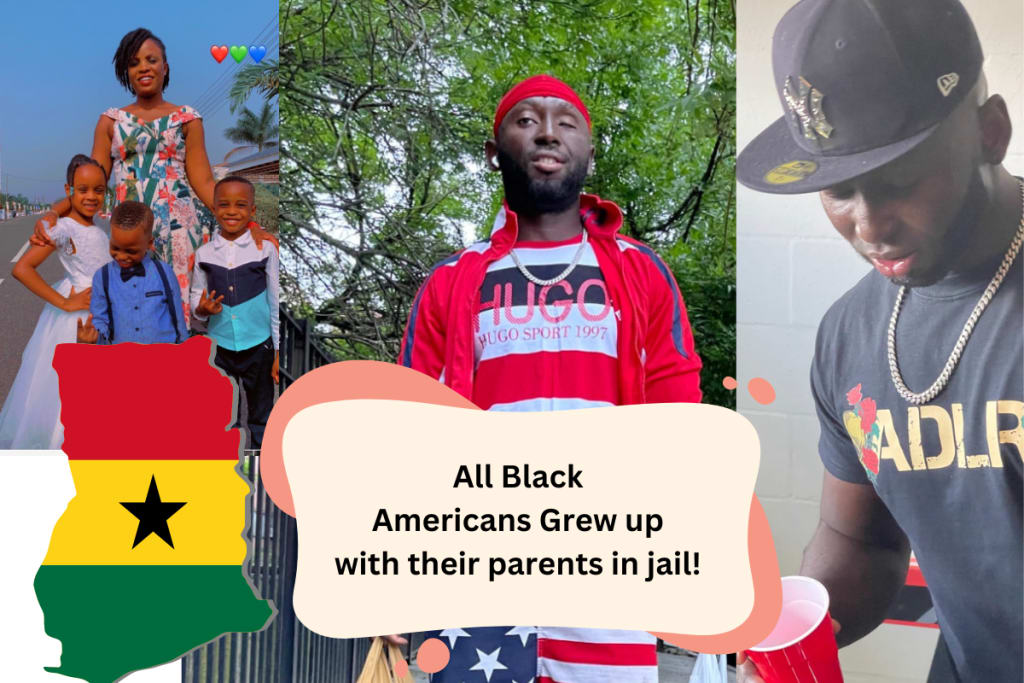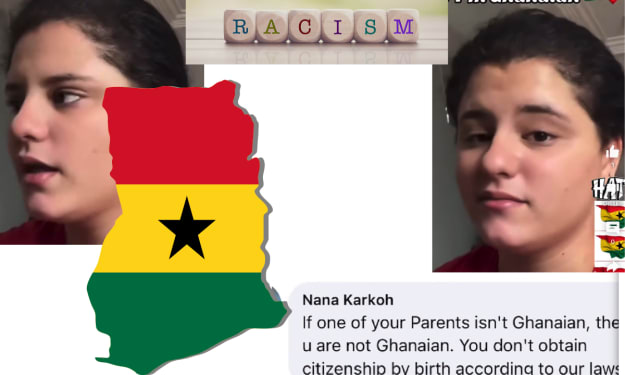Ghanaian Living in Maryland USA Rants That Black Americans Have No Traditions or Respect For Elderly He Refuses to Have Black American Friends
Unlike Ghanaians who are raping & murdering women and girls

Wednesday, 20 March 2024
By: TB Obwoge
It is starting to look as if in order to obtain a visa from any US Embassy in an African country, that all you have to do is proclaim your hatred for Black Americans and you're approved.
It can be the only reason that thousands of Black Africans living and moving to the Untied States have such a hatred for Black Americans. This would get you killed in their countries, especially Ghana where I get death threats for not praising their country and the rude behavior of the majority of the citizens that have bullied me for the better part of 2-years living in Ghana.
Ghanaians are allowed to talk bad about their country, you as a foreigner can't say anything but praise the highly corrupted and 60% underdeveloped country.
Where almost every person is focused on the color and shade of a persons skin. They proudly call people "darky, blacky, Yevu, white" and if you're Asian you are all Chinese. I've even had someone in Ghana speak to me with a mocking Chinese voice they strung together some "ching, chongs!"
Thinking surely that they were hurting my feelings, to which I didn't understand, the man then laughed and said to my driver that he thought my light Black skin was that of a Chinese person, with dreadlocks and tattoos to boot. This is the mentality of the average Ghanaian, which forever goes unchecked.
Again I wrote before about a white American man who was so proud to proclaim his friendships with several Black Africans who hated Black Americans. This white man was a transportation driver who drove Black Americans and others to medical appointments.
He seemed to beam with glee as he talked about his Pennsylvania card games with Black Africans who constantly talked about their hatred for Blacks in the the United States, while they were immigrants in the US.
You can read that by clicking here.
In a Ghana expat group, many people have said that Ghanaians were not ready to accept foreigners into their country. This is one of the least talked about things in Ghana currently. Citizens who are hell bent on proclaiming Ghana the as the center of the African continent, who stare endlessly, mock and take videos & photos of anyone who looks different.
How Black America Fell Out Of Love With Africa
In the West African Kingdom of Dahomey, before the Kingdom’s captives departed for the New World to be enslaved, they were forced “to march around the ‘Tree of Forgetfulness’ six times” so that they would remember neither their home continent nor the people they were leaving behind.
By the middle of the 18th century, the British were annually shipping tens of thousands of Africans in chains from the west coast of Africa across the Atlantic Ocean, feeding their seemingly inexhaustible desire for enslaved labor to work their sugar plantations dotted across the Caribbean. These voyages have frequently been referred to as the Middle Passage, a one-way journey transforming Africans into Black slaves. Its irreversibility is a bedrock of the African American origin story.
The Dahomey aristocrats forced captives to sever ties with their homeland. In the same vein, contemporary Afro-pessimist intellectuals argue that the Middle Passage means today’s Africans and members of the African diaspora have forgotten one another. Afro-pessimism is a theory developed by Black American intellectuals like Frank Wilderson, Christina Sharpe, Saidiya Hartman and Fred Moten, which holds that the experience of racism and slavery in the Americas makes the Black American experience so unique that it cannot be compared with the suffering of other peoples.
Rendered strangers by the Middle Passage, Afro-pessimists see no shared identity that can serve as the basis for solidarity between Africans and African Americans. Historical records, however, show that occasionally, some captives, even after forcibly crossing the Atlantic, later returned to their homes in Africa as freemen.
Despite the cruelty of slavery throughout the Atlantic world and herculean efforts on the part of European and African elites to force the enslaved to forget their past, connections between the African diaspora in the New World and those who remained in Africa persisted and grew. By the beginning of the 20th century, ties across the Atlantic gave rise to Pan-Africanism, which helped fuel the social movements that resulted in the wave of independent states in Africa and Civil Rights legislation in the United States during the 1960s.
Pan-Africanism sees the suffering of Black people throughout the world, whether from colonialism, slavery or segregation, as interrelated. No less a figure than Martin Luther King Jr. understood these struggles to be connected. In Ghana for the celebration of its independence from Britain, Dr. King said, “This event, the birth of this new nation, will give impetus to oppressed peoples all over the world. I think it will have worldwide implications and repercussions — not only for Asia and Africa, but also for America.” For decades, through the final overthrow of apartheid in South Africa in the 1990s, movements for the rights of Black Africans on both sides of the Atlantic propelled and reinforced one another.
As an ideology, Pan-Africanism’s fiercest proponents — W. E. B. Du Bois, Henry Sylvester Williams, C. L. R. James and George Padmore — argued that the struggle for national self-determination was essential to the reassertion of Black Africans’ rightful place on the world stage and their self-respect.
Yet by the 1990s, the equation of self-determination with self-respect was being challenged from three directions. The first and perhaps oldest line of critique, launched during the Cold War, argued that when nationalist movements came to power, they frequently created authoritarian states. The second, building on postcolonial authoritarianism, highlighted the ways in which African elites were impoverishing their peoples.
This above narrative doesn't explain why so many Black Africans have such a hatred for Black Americans. Nor why despite trying to die to immigrate the the United States so many Black Africans have such hatred and jealousy for Black Americans. While using the culture, music, slang and even the dressing of Black America, some Black Africans will still claim that there are no traditions and culture within the Black American community.
Many Black Americans living in Ghana throw away all that they created within the US to fit into life pretending to be Ghanaians. These people have changed their names, changed their way of life to embrace only that of Ghana. Sadly there are many homophobic and hateful Black Americans living in Ghana some even calling for the death of homosexuals.
©️TB Obwoge 2024 All Rights Reserved
About the Creator
IwriteMywrongs
I'm the president of a nonprofit. I've lived in 3 countries, I love to travel, take photos and help children and women around the world! One day I pray an end to Child Marriages, Rape and a start to equal Education for ALL children 🙏🏽






Comments
There are no comments for this story
Be the first to respond and start the conversation.